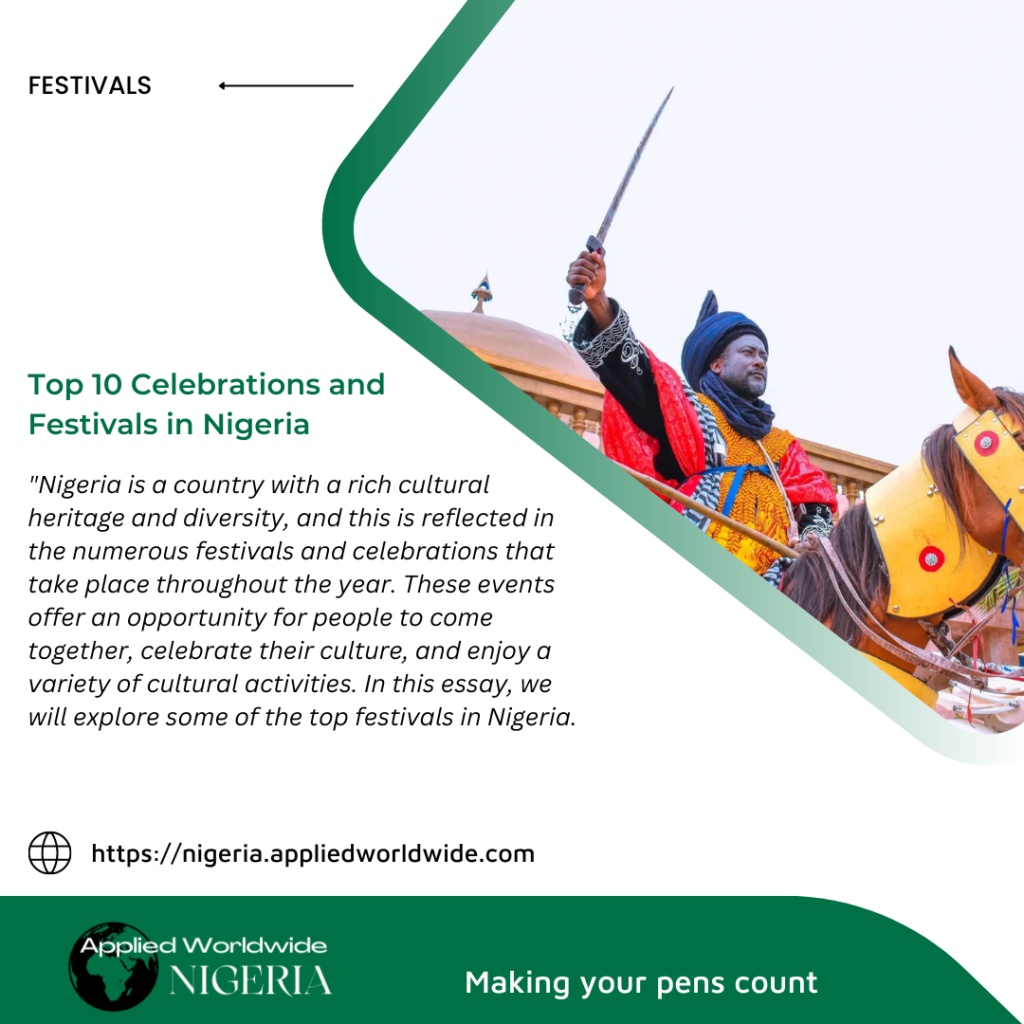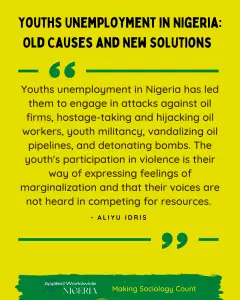Nigeria, located in West Africa, is a country with a rich cultural heritage and diversity, and this is reflected in the numerous festivals and celebrations that take place throughout the year. From religious festivals to traditional celebrations, these events offer an opportunity for people to come together, celebrate their culture, and enjoy a variety of cultural activities. In this essay, we will explore some of the top festivals in Nigeria.

Eyo Festival
The Eyo Festival, also known as the Adamu Orisa Play, is one of the most popular cultural festivals in Nigeria, celebrated in Lagos State. It is a traditional Yoruba festival that honors the ancestors and marks the transition of the spirits from the physical to the spiritual world. The festival is usually held to commemorate the death of an important figure or to mark significant occasions such as the installation of a new king. The festival is characterized by the masquerades, known as the Eyo, which are dressed in white robes and colorful headpieces. The Eyo parade through the streets, accompanied by drummers and singers, and perform traditional dances.
Durbar Festival
The Durbar Festival is celebrated in several states in northern Nigeria, including Kano, Kaduna, and Zaria. It is a colorful festival that celebrates the end of the Muslim fasting period of Ramadan and the beginning of the Eid al-Fitr holiday. The festival features a parade of beautifully adorned horses and camels, ridden by traditional warriors and princes. The riders dress in colorful traditional attire and carry swords, spears, and shields, while the animals are adorned with colorful beads and decorative materials. The Durbar Festival is a popular tourist attraction and provides a glimpse into the rich cultural heritage of northern Nigeria.
New Yam Festival
The New Yam Festival, also known as Iri Ji Ohuru or Iwa Ji, is a traditional festival celebrated in many communities in Nigeria, particularly in the southeastern region of the country. The festival is held to mark the beginning of the yam harvesting season, which is an important staple crop in Nigeria. The festival is a time for giving thanks to the gods for a bountiful harvest and seeking their blessings for the coming year. The festival features a procession of people dressed in colorful traditional attire, carrying yams and other agricultural products, and performing traditional dances and music.
Osun Osogbo Festival
The Osun Osogbo Festival is a major cultural festival celebrated in Osogbo, Osun State. It is a religious festival that honors the Osun River goddess, who is believed to be the protector of the town. The festival is celebrated in August every year and is characterized by a procession of people dressed in traditional attire, carrying offerings of food and other gifts to the Osun River. The festival also features traditional dances, music, and other cultural activities.
Argungu Fishing Festival
The Argungu Fishing Festival is a popular cultural festival celebrated in Kebbi State, located in northern Nigeria. The festival is held annually to mark the end of the farming season and the beginning of the fishing season. The festival features a fishing competition, where fishermen use traditional methods to catch the largest fish possible in the Argungu River. The festival also features cultural activities such as traditional dances, music, and crafts.
Ojude Oba Festival
The Ojude Oba Festival is a cultural festival celebrated in Ijebu Ode, Ogun State, located in southwestern Nigeria. The festival is held to honor the traditional ruler of the town and is usually celebrated two days after the Eid al-Fitr holiday. The festival features a procession of people dressed in colorful traditional attire, representing various age groups, families, and societies in the town. The festival also features cultural activities such as traditional dances, music, and a display of traditional crafts and artworks.
Carniriv
Carniriv is a popular cultural festival celebrated in Port Harcourt, Rivers State. The festival is an annual event that attracts tourists from all over the world. It features a carnival procession, where participants dressed in colorful costumes and masks dance and parade through the streets. The festival also features a beauty pageant, a music concert, and other cultural activities.
Calabar Carnival
The Calabar Carnival is one of the biggest cultural festivals in Nigeria, celebrated in Calabar, Cross River State, located in southern Nigeria. The festival is an annual event that attracts thousands of tourists from all over the world. The festival features a parade of colorful floats, where participants dressed in elaborate costumes and masks dance and perform traditional dances. The festival also features a beauty pageant, a music concert, and other cultural activities.
Ofala Festival
The Ofala Festival is a cultural festival celebrated in many communities in southeastern Nigeria, particularly in Anambra State. The festival is held to honor the traditional ruler of the town and is usually celebrated during the Christmas season. The festival features a procession of people dressed in colorful traditional attire, representing various age groups, families, and societies in the town. The festival also features traditional dances, music, and other cultural activities.
Sango Festival
The Sango Festival is a religious festival celebrated in many communities in southwestern Nigeria, particularly in Oyo State. The festival is held to honor the deity Sango, who is believed to be the god of thunder and lightning. The festival features a procession of people dressed in traditional attire, carrying offerings of food and other gifts to the Sango shrine. The festival also features traditional dances, music, and other cultural activities.
Final Thoughts
In conclusion, Nigeria is a country rich in cultural heritage, diversity, and traditions. The celebrations and festivals listed above are just a few examples of the many cultural events that take place in Nigeria throughout the year. These festivals offer an opportunity for people to come together, celebrate their culture, and enjoy a variety of cultural activities. They also provide a glimpse into the rich cultural heritage of Nigeria and the importance of tradition and community in Nigerian culture.





